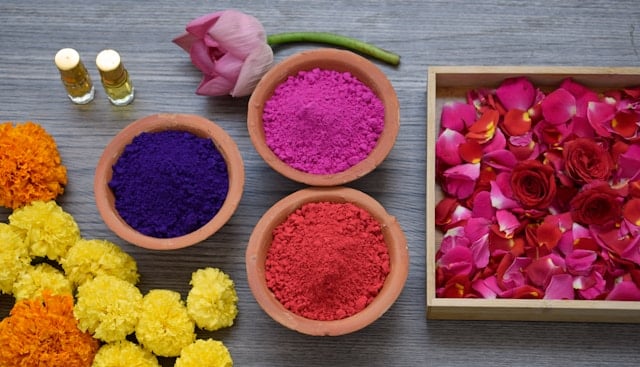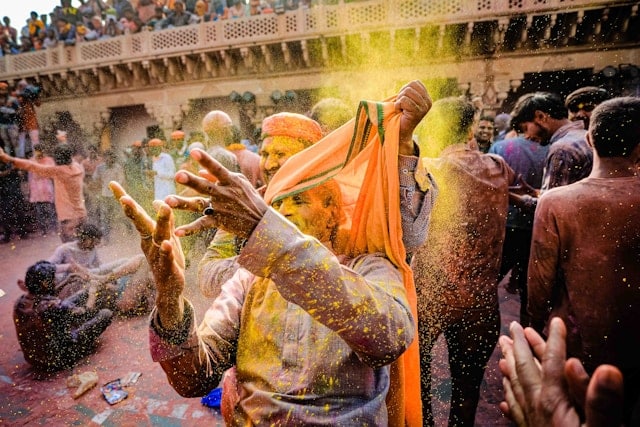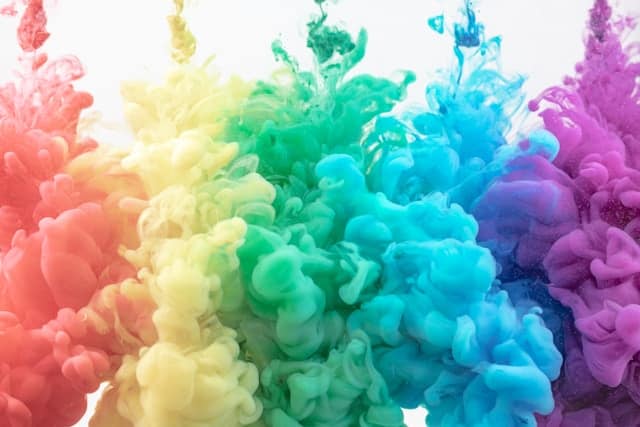Holi is the Hindu festival of colours which dates back as far as the 4th Century. Its cultural significance is comparable to that of Diwali, the festival of lights and is one of the most important events in the Hindu calendar. But how is this global festival celebrated in the UK? Remitly is about to explain.
Celebrating aspects of life such as spring, love and new life, Holi marks the beginning of spring and the end of winter. Holi celebrates the Hindu God Krishna and sees celebrants take to the streets to throw paint and coloured water into the air. Participants also smear one another with vibrantly coloured paints and water. Holi is widely observed in India and Nepal, so how is this festival celebrated in the UK?
Growing in popularity in the UK, Holi is most widely celebrated amongst the British-Indian community, but many people from other cultures take part also. The celebration takes place both at traditional Hindu temples and large-scale public festivals across the UK. In this article, we’ll guide you on where and how to celebrate Holi in the UK, from religious observances to vibrant colour festivals.
The Significance of Holi
Mythological Origins
The festival has its roots in legend. The story tells of an evil king called Hiranyakashipu who possessed powers, making him near-invincible. As his power grew, Hiranyakashipu began acting out the power of a god, punishing or killing those who disobeyed him.
However, his son, Prahlad disobeyed his father, choosing to worship Bishnu instead of him. Hiranyakashipu in response, asked his sister Holika to kill him. Hiranyakashipu and Holika attempted to carry out this evil task but were instead defeated by Vishnu (the force of good).
Cultural & Social Importance
Holi is celebrated as a time of renewal, joy, and unity, breaking down social barriers and bringing people closer. Holi is there to serve as a reminder of the powers of good over evil. It also demonstrates the devotion that god shows to its devotees, especially in times of need.
Traditional Holi Practices
Traditional practices include lighting the Holika bonfire, also known as the Holika Dahan as well as throwing coloured powders, and festive feasting.
Some celebrants believe the Holi colours come from Krishna who is said to have thrown coloured water over his milkmaids as a boy. Others believe that each colour represents a different meaning. Red for example, is said to represent love and fertility and green stands for new beginnings.
How Holi Is Celebrated in the UK
Traditional Holi Celebrations in the UK
Holi is celebrated in many Hindu temples across the UK. Community gatherings in towns and cities across the UK also host street parties and fun events. Some of the large parks host big music festivals and colour runs in the spirit of Holi. Large cities like London, Leicester, Birmingham, and Manchester are some of the top destinations, but many smaller towns with larger Indian-British communities can be popular also.
Family & Community Celebrations
British-Indian families celebrate Holi in different ways. Many families enjoy Holi-themed meals, dance parties and games. Traditional Bollywood-style music might be played as well as Holi colour-themed games. Families may choose to light a bonfire the night before Holi known as the Holika Dahan. At the same time, traditional Holi food is enjoyed, from gujiya, thandai, and pakoras.

The Best Holi Festivals & Events in the UK
London
London arguably plays host to the largest celebrations of Holi in the UK. Being the capital, there are many sites, arenas and festivals to choose from. These include Wembley Arena, Southall, and Trafalgar Square, featuring Bollywood music and colour play. Events like London Ki Holi and the London Holi colour run are attended by thousands.
Leicester
Leicester is said to have the largest Holi celebrations outside India with places like Cossington Recreation Ground and the Maher Centre hosting events. Celebrations include temple-led processions and community events.
Birmingham
Destinations such as the Birmingham Museum of Art and The Core Theatre in Solihull, have both hosted Holi events in the past. Celebrations have included art activities, live DJs and dance performances.
Manchester & Edinburgh
The growing interest in Holi celebrations throughout Manchester has seen events take place in Platt Fields Park, Heaton Park and at temples like the Shree Radha Krishna Mandir. Similarly, Edenborough hosts one of the biggest Holi festivals of the year, Holi one. Historically, Edenborough has also hosted the Holi RangBarse festival which includes a live DJ performance Indian street food, Organic colour powder and traditional Hindu dance performances.
Music, Dance, & Colour Play at Holi Festivals
Bollywood DJs & Live Music
Popular Holi music events like the Magic of India Holi Colour Party in London and London ki Holi Festival feature traditional and contemporary Indian Music. Elsewhere in the country, events like the Leeds Holi festival and Colour Mania host live music with different acts and performers.
Many of these events are ticketed and sell out fast so make sure to buy tickets well in advance!
Dance Performances & Workshops
Bollywood dance performances and Holi flash mobs are a great way to witness the traditional dancing styles of India. Groups may sing and dance to traditional instruments such as the Dholak or the Sitar. Dance workshops are also offered by many community groups as well as private lessons and classes to schools.
Colour Throwing & Water Play
Arguably the best-known part of the celebration of Holi, the act of colour throwing and water play sees thousands of participants covered in vibrant coloured powders.
This tradition encapsulates the essence of Holi and the significance it bears on the story of Holika and Prahad. Colours play a significant role in the celebrations as they represent different emotions and elements of nature. Red, for example, symbolises love and fertility, whilst yellow signifies prosperity and new beginnings.
Family-Friendly & Community Holi Celebrations
Safe & Non-Toxic Colours for Children
For those worried about the safety of the powders used for colour throwing have a variety of eco-friendly and skin-safe options to choose from. Though they can be bought, homemade variations are an option too. Not to mention they can be great fun to make!
Cultural Awareness & Inclusivity
Holi is a truly global celebration. Though most commonly celebrated in India and Nepal, Holi events take place in many countries across the world. From countries like Spain and Italy to Thailand and Indonesia, Holi is considered a global, multicultural event.
Local Community Holi Gatherings
Holi events can be found online through websites like Eventbrite. Social media sites like Facebook, Instagram and Twitter are also great places to find what’s going on in your local area.

Tips for Enjoying Holi in the UK
Where to Buy Holi Colours
Holi colours are available at many Indian grocery stores, online shops, and at festival venues. However, as we mentioned earlier, making homemade colours with natural ingredients can be both fun and cheaper.
What to Wear
Holi incorporates many traditional outfits. As per the colourful nature of the occasion, choices like the sarees, salwar kameez, and lehengas are great options. If not, bright or light-coloured clothing will work perfectly. Remember, this celebration is meant to signify the victory of good over evil (light over dark) so bright, flamboyant colours are encouraged.
Protecting Skin & Hair
Due to the pigment of the colours used, some temporary staining of the skin may be experienced. This can be combatted by applying coconut oil onto exposed parts of the skin to form a barrier before taking part in festivities. If staining occurs, it is recommended that the area is rinsed thoroughly with water. It’s also been suggested that rubbing lemon over the area may help remove any colour.
As for the eyes, some participants choose to wear sunglasses to protect their eyes from being affected or damaged due to the colours being thrown. Please note that this is not medical advice. If you have medical concerns, seek professional medical attention/advice.
Respecting Holi Traditions
If you’re not familiar with Holi traditions and customs, you may fall foul of some of the principles around cultural etiquette. Whilst there aren’t any strict rules per se, it’s worth doing some research beforehand to ensure that no unintentional offence is caused to others taking part.
The Growing Popularity of Holi in the UK
It’s interesting to see how the celebration of Holi, once considered an occasion only for those of certain religious faiths or from certain cultures, has expanded to many diverse backgrounds. In the UK, we’ve seen plenty of examples of those who wouldn’t consider themselves Hindu, embracing this cultural celebration.
This embrace is due in part to the role of many UK universities, cultural organisations, charities, businesses and of course those from the Indian community themselves. Popularity and awareness of Holi has been driven further by the power of social media, attracting people all over the country.
Quick Summary
The Hindu festival known as Holi has expanded into a global celebration. Many cultures, religions and backgrounds recognise this event as special. It’s a chance to experience something truly remarkable and see how the power of joy, love and unity can bring people together.
From temple-led events to public festivals and gatherings In parks, Holi is widely celebrated across the UK. Many of the big cities such as London, Leicester, Birmingham and Manchester host large live music events, festivals and colour runs. These events see people in their thousands take part and immerse themselves in the culture around Holi. It’s a chance to experience different cultures, food, dance and song. Of course, Holi is best known for its vibrant colour throwing which sees many people covered in coloured water and paint.
For those yet to experience the wonder of Holi, we’d encourage them to get involved by finding a Holi event close by. There’s never been a better opportunity to connect with the British-Indian community and enjoy this wonderful event.
FAQs
Where can I celebrate Holi in the UK?
It’s worth checking social media, local community boards and forums and of course the internet. The big cities like London, Manchester and Leicester are always a good bet when it comes to the larger events and festivals.
Are Holi events in the UK open to non-Hindus?
Yes! Holi is open to all people of different cultures, backgrounds and religions. So long as you remain courteous and respectful of Holi traditions and etiquette, there’s no reason why anyone couldn’t get involved. We’d recommend doing a bit of prior research beforehand to ensure people have the best experience possible.
Which cities in the UK have the biggest Holi celebrations?
Being the capital, we’d say London hosts the biggest Holi events. Historically, London has hosted events at Wembley Arena, Southall, and Trafalgar Square.
Are Holi colours safe for the skin?
We can’t vouch for every product out there and there may be some participants using colours which are considered less safe than others. Some colours have been known to contain synthetic dyes which may contain heavy metals such as lead. We’d recommend applying a layer or two of petroleum jelly or coconut oil onto the skin before participating. This helps form a barrier between potentially unsafe chemicals and the skin. As ever, if you’re concerned about something, seek proper medical advice.
What should I wear to a Holi festival in the UK?
Holi is best known for its bright colours which signify joy and the victory of good over evil. For this reason, we’d recommend wearing something bright and flamboyant. Definitely don’t wear anything you wouldn’t want to get ruined by coloured dye though!
Is there an age limit for attending Holi festivals in the UK?
This depends on the event. Some UK events like music festivals stipulate an age limit of 18 plus, however, Holi is broadly regarded as a family event. For this reason, family-friendly celebrations led by communities and small event organisers are often open to people of all ages.
